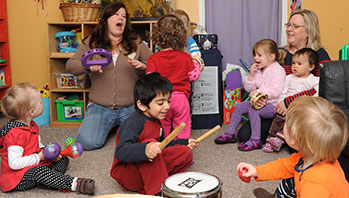MA Standards
Speaking and Listening/SL.PK.MA.1a: Observe and use appropriate ways of interacting in a group (e.g., taking turns in talking, listening to peers, waiting to speak until another person is finished talking, asking questions and waiting for an answer, gaining the floor in appropriate ways).
Head Start Outcomes
Social Emotional Development/Self-Regulation: Follows simple rules, routines, and directions.
Logic and Reasoning/Reasoning and Problem Solving: Classifies, compares, and contrasts objects, events, and experiences.
Language Development/Receptive Language: Attends to language during conversations, songs, stories, or other learning experiences.
PreK Learning Guidelines:
English Language Arts/Language 1: Observe and use appropriate ways of interacting in a group (taking turns in talking; listening to peers; waiting until someone is finished; asking questions and waiting for an answer; gaining the floor in appropriate ways).
English Language Arts/Reading and Literature 12: Listen to, recite, sing, and dramatize a variety of age-appropriate literature.
Sing Together: “The Opposite Song”

© Commonwealth of Massachusetts, Department of Early Education and Care (Jennifer Waddell photographer). All rights reserved.
ELA Focus Skills: Phonological Awareness (Rhythm, Rhyme, and Repetition), Vocabulary (Opposites)
Remind children that in the book The Ugly Vegetables, the little girl thought the other gardens were beautiful but she felt her garden was ugly. Explain that the words beautiful and ugly mean two completely different things. Say, They are opposite words.
- Give a few more examples of opposite words. Say The opposite of the word yes is no. The opposite of the word up is down. Ask, What do you think the opposite of the word hot is? (cold) What about the opposite of the word happy? (sad)
- When you feel children have grasped the concept of opposite words, tell them you are going to teach them a song about opposites.
Sing “The Opposite Song” for children. As you sing the second and third verses, say the first word in each opposite pair, then start the next line and cue children to supply the opposite word. For example, you say stop/children say go. Repeat with yes/no, fast/slow, low/high, hi/bye, and wet/dry.
The Opposite Song
(sung to the tune of “Do You Know The Muffin Man?”)
Oh, do you know some opposites,
Some opposites,
Some opposites?
Oh, do you know some opposites?
Opposites are fun.
If I say stop, then you say go.
If I say yes, then you say no.
If I say fast, then you say slow.
Oh, opposites are fun.
If I say low, then you say high.
If I say hi, (wave hand), then you say bye.
If I say wet, then you say dry.
Oh, opposites are fun.
Take It Further: Encourage children to think of other opposites to include in the song. Other opposites might include dark/light, day/night, left/right, young/old, bought/sold, hot/cold, low/high, sell/buy, ground/sky.
